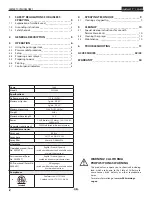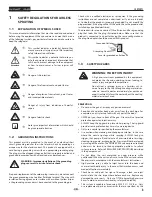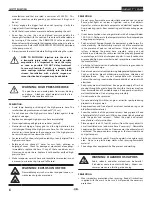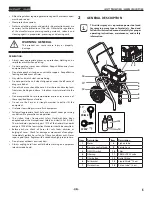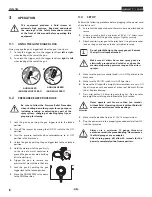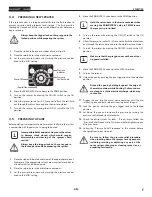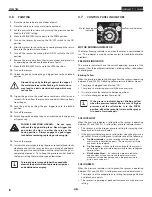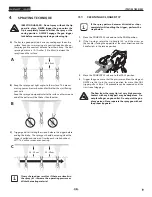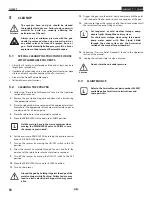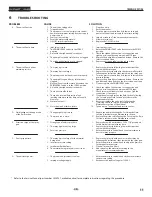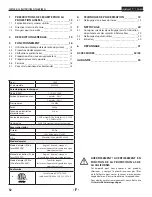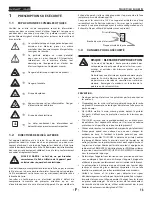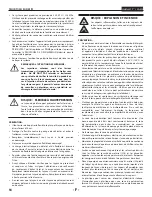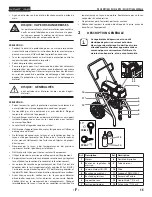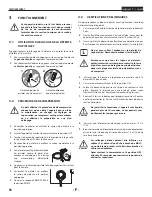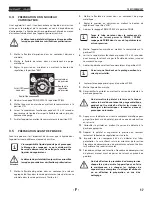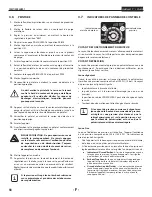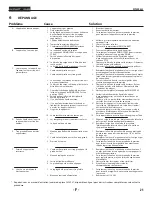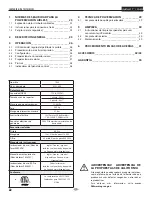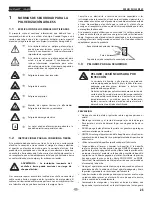
8
OPERATION
IMPACT 1040
3.6
PAINTING
1.
Place the siphon tube into a container of paint.
2.
Place the return hose into a metal waste container.
3.
Set the pressure to minimum by turning the pressure control
knob to the “MIN” setting.
4.
Move the PRIME/SPRAY valve down to the PRIME position.
5.
Turn on the sprayer by moving the ON/OFF switch to the ON
position.
6.
Allow the sprayer to run until paint is coming through the return
hose into the metal waste container.
7.
Turn off the sprayer by moving the ON/OFF switch to the OFF
position.
8.
Remove the return hose from the waste container and place it in
its operating position above the container of paint.
9.
Move the PRIME/SPRAY valve up to the SPRAY position.
10.
Turn on the sprayer.
11.
Unlock the gun by turning the gun trigger lock to the unlocked
position.
Ground the gun by holding it against the edge of
the metal container while flushing. Failure to do so
may lead to a static electric discharge, which may
cause a fire.
12.
Trigger the gun into the metal waste container until all air and
solvent is flushed from the spray hose and paint is flowing freely
from the gun.
13.
Lock the gun by pushing the gun trigger lock to the locked
position.
14.
Turn off the sprayer.
15.
Attach tip guard and tip to the gun as instructed by the tip guard
or tip manuals.
POSSIBLE INJECTION HAZARD. Do not spray
without the tip guard in place. Never trigger the
gun unless the tip is in either the spray or the
unclog position. Always engage the gun trigger
lock before removing, replacing or cleaning tip.
16.
Turn on the sprayer.
17.
Increase the pressure by turning the pressure control knob slowly
clockwise and test the spray pattern on a piece of cardboard.
Adjust the pressure control knob until the spray from the gun is
completely atomized. Try to keep the pressure control knob at
the lowest setting that maintains good atomization.
i
Turning the pressure up higher than needed to
atomize the paint will cause premature tip wear
and additional overspray.
3.7
CONTROL PANEL INDICATORS
RAPID
CLEAN
Pressure Indicator
Motor Running
Indicator
MOTOR RUNNING INDICATOR
The Motor Running indicator is on when the motor is commanded to
run. This indicator is used by service centers to troubleshoot motor
problems.
PRESSURE INDICATOR
The pressure indicator shows the current operating pressure of the
sprayer. It has three different indications: blinking yellow, solid yellow,
and solid green.
Blinking Yellow
When the pressure indicator is blinking yellow, the sprayer is operating
between 0 and 200 PSI. A blinking yellow pressure indicator means:
•
The sprayer is plugged in and turned “ON”
•
The sprayer is at priming pressure (little or no pressure)
•
It is safe to move the relief valve between positions
•
It is safe to change or replace the spray tip
i
If the pressure indicator begins blinking yellow
when the pressure control knob is set at a higher
pressure and the relief valve is in the SPRAY
position, either the spray tip is worn or the sprayer
is in need of service/repair.
SOLID YELLOW
When the pressure indicator is solid yellow, the sprayer is operating
between 201 and 1900 PSI. A solid yellow pressure indicator means:
•
The sprayer is at the proper pressure setting for spraying stain,
lacquer, varnish, and multi-colors
•
If the pressure indicator goes to solid yellow when the pressure is
set so that it starts at solid green, it indicates one of the following:
a. Tip Wear Indicator — when spraying with latex or at high
pressure the solid yellow appears. This means the tip is worn
and needs to be replaced.
b. Tip Too Large — when a tip that is too large for the sprayer is
put in the gun, the pressure indicator will turn from solid green
to solid yellow.
c. Fluid Section Wear — if a solid yellow pressure indicator
appears when using a new tip and the pressure is set at
maximum, service may be required (worn packings, worn
piston, stuck valve, etc...).
SOLID GREEN
When the pressure indicator is solid green, the sprayer is operating
between 1901 and 3300 PSI. A solid green pressure indicator means:
•
The sprayer is at the proper pressure setting for spraying oil-based
and latex house paints
•
The sprayer is operating at peak performance at a high pressure
setting


